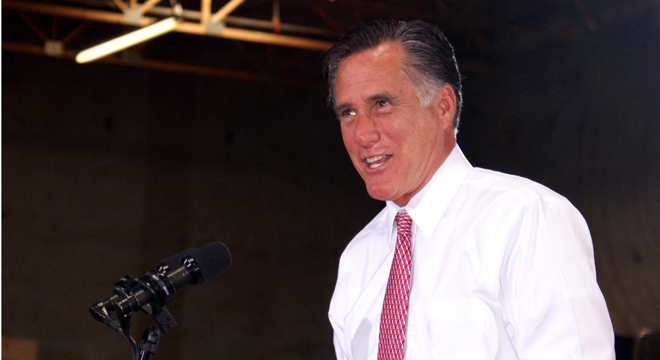President Obama put Mitt Romney in a political box Friday when he circumvented a congressional blockage and implemented the spirit of the DREAM Act through executive action. With no other choice, Romney finally started talking about immigration — and showcased an emerging general election message that’s much different from the hardline anti-immigration rhetoric that was a key component of his primary campaign.
Romney took a timeout from his bus tour stop in New Hampshire to criticize Obama — albeit tepidly — for his immigration move. He also expressed support for the man trying to rebuff immigration hardliners within the GOP, Sen. Marco Rubio (R-FL).
“I think the action that the president took today makes it more difficult to reach that long-term solution because an executive order of course is just a short-term matter,” Romney said.
What followed would have been unthinkable for Romney during the primaries, when the only talk about the DREAM Act was Romney’s vow to veto it. Romney didn’t promise to reverse Obama’s ruling, nor did he even outright condemn the action, or its intentions:
“I would like to see legislation that deals with this issue. And I happen to agree with Marco Rubio as he will consider this issue. He said this is an important matter. We have to find a long-term solution. But the president’s action makes reaching a long-term solution more difficult. If I’m president, we’ll do our very best to have that kind of long-term solution that provides certainty and clarity for the people who come into this country through no fault of their own by virtue of an act of their parents.”
Rubio’s response to the Obama administration decision, which Romney said represented his feelings as well, didn’t attack the intentions behind Obama’s move, either. Instead, Rubio attacked the way Obama set about enacting DREAM-like policy.
“There is broad support for the idea that we should figure out a way to help kids who are undocumented through no fault of their own, but there is also broad consensus that it should be done in a way that does not encourage illegal immigration in the future,” Rubio said. “This is a difficult balance to strike, one that this new policy, imposed by executive order, will make harder to achieve in the long run.”
The Obama team seized on Romney’s seeming reversal.
“During the primaries, Gov. Romney called the DREAM Act a handout and said he would veto it. His ‘solution’ to our immigration challenges was self-deportation,” Obama campaign spokesman Ben LaBolt said in a statement. “The president remains committed to passing the DREAM Act, which was drafted with bipartisan support, but he won’t sit back and allow these children to get deported in the face of inaction. Congressional Republicans must end their continued obstruction to allow us to achieve the ultimate goal of signing the DREAM Act into law.”
During the primaries, Romney bludgeoned his opponents for suggesting that dealing with the children of illegal immigrants was a noble goal. When Rick Perry told a Florida debate audience that Republicans opposed to the idea behind his state’s version of DREAM Act measures don’t “have a heart“, Romney pounced.
“My friend Gov. Perry said if you don’t agree with his position on giving that in-state tuition to illegals, that you don’t have a heart,” Romney told a Florida crowd the next day. “I think if you’re opposed to illegal immigration, it doesn’t mean that you don’t have a heart. It means that you have a heart and a brain.”
Perry’s crime was signing a law granting in-state tuition prices to the children of illegal immigrants in Texas. The bill was passed with an overwhelming bipartisan majority in Texas. At the time, Romney said it “makes no sense.”
In those days, Romney was still taking counsel from immigration hardliners, including Kansas Secretary of State Kris Kobach, the architect of the state immigration laws in Arizona and Alabama that have outraged Hispanic advocates. Later in the year, Romney distanced himself from Kobach, though his campaign still calls him an “informal adviser.”
Kobach’s hard line against Obama’s new policy puts Romney’s kinder, gentler reaction into perspective:
“What the president is describing is a policy that we will refuse to initiate deportation proceedings,” Kobach told ThinkProgress. He called the new White House policy “illegal.” Kobach did not immediately respond to a request for comment from TPM.
Romney has avoided the topic of immigration ever since the primary fight came to an end. He’s shied from the topic, even when speaking to Hispanic audiences, and has insisted that his quest to win the Hispanic vote will be focused solely on the economy.
When Rubio debuted his plan for a GOP-friendly DREAM Act in April — a plan Kobach disagreed with publicly — Romney held a press conference with the Florida senator but stayed coy about whether he backed Rubio’s plan.
Now, after Obama forced immigration onto center stage, Romney appears to be running toward Rubio — and far away from the immigration hardliners who helped burnish his conservative bona fides on the primary campaign trail.






